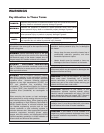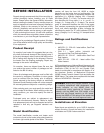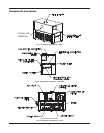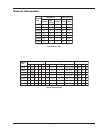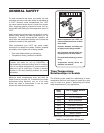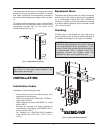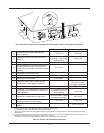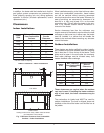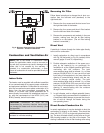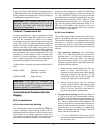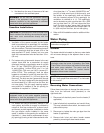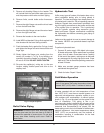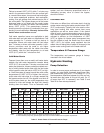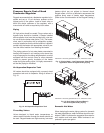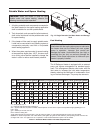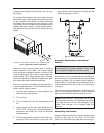
12
Fig. 8: Minimum Clearances from Combustible
Surfaces – Outdoor Installations
Combustion and Ventilation Air
Indoor Units
The heater must be supplied with sufficient quantities
of non-contaminated air to support proper combustion
and equipment ventilation. Combustion air can be sup-
plied via conventional means where combustion air is
drawn from the area immediately surrounding the
heater, or via direct vent, where combustion air is
drawn directly from outside. All installations must com-
ply with the requirements of the NFGC (U.S.) and
B149 (Canada), and all local codes.
Reversing Air Filter
Follow these instructions to change the air duct con-
nection from the left-hand side (standard) to the
right-hand side:
1. Remove the four screws and the dust cover from
the right-hand side of the heater.
2. Remove the four screws and the air filter bracket
from the left-hand side of the heater.
3. Reverse the components and reattach in the new
location, making sure that the air filter locking
bracket is on the bottom. (The air filter locking
bracket is reversible.)
Direct Vent
If outside air is drawn through the intake pipe directly
to the unit for combustion:
1. Install combustion air direct vent in accordance
with Fig. 29 (horizontal) or Fig. 30 (vertical) of this
manual (pages 31 and 32, respectively).
2. Provide adequate ventilation of the space occu-
pied by the heater(s) by an opening(s) for
ventilation air at the highest practical point com-
municating with the outdoors. The total
cross-sectional area shall be at least 1 in.
2
of free
area per 20,000 BTUH (111 mm
2
per kW) of total
input rating of all equipment in the room when the
opening is communicating directly with the out-
doors or through vertical duct(s). The total
cross-sectional area shall be at least 1 in.
2
of free
area per 10,000 BTUH (222 mm
2
per kW) of total
input rating of all equipment in the room when the
opening is communicating with the outdoors
through horizontal duct(s).
3. In cold climates, and to mitigate potential freeze-
up, Raypak highly recommends the installation of
a motorized sealed damper to prevent the circula-
tion of cold air through the heater during the
non-operating hours.
Direct-Ducted Combustion Air
In certain applications it may be desirable to duct the
combustion air directly to the heater. This should be
done with PVC, CPVC or single-wall galvanized duct-
ing. The duct will attach directly to the collar on the air
filter housing located on the side of the heater. The
ducting is attached to the air filter housing collar using
CAUTION: Combustion air must not be
contaminated by corrosive chemical fumes which
can damage the heater and void the warranty. (See
the Appendix.)
NOTE: It is recommended that the intake vent be
insulated to minimize sweating.
NOTE: Use of the heater in construction areas
where fine particulate matter, such as concrete or
dry-wall dust, is present may result in damage to the
heater that is not covered by the warranty. If
operated in a construction environment, a clean
source of combustion air must be provided directly to
the heater.



